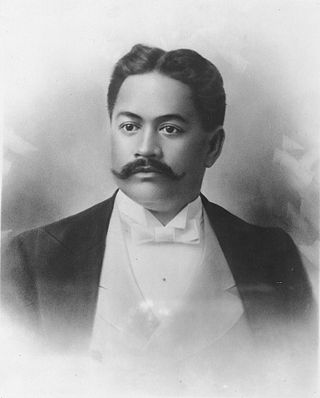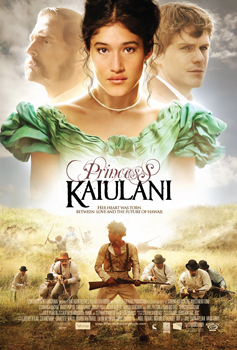People's Princess is a nickname for Diana, Princess of Wales.
People's Princess or Princess of the People may also refer to:
Mary may refer to:
Queen or QUEEN may refer to:
Work may refer to:
Princess Victoria or Viktoria may refer to:
Anastasia is a feminine given name of Greek origin, derived from the Greek word anástasis (ἀνάστασις), meaning "resurrection". It is a popular name in Eastern Europe.
Mary Stuart or Mary Stewart may refer to:

Kaʻiulani was the only child of Princess Miriam Likelike, and the last heir apparent to the throne of the Hawaiian Kingdom. She was the niece of King Kalākaua and Queen Liliʻuokalani. After the death of her mother, Princess Kaʻiulani was sent to Europe at age 13 to complete her education under the guardianship of British businessman and Hawaiian sugar investor Theo H. Davies. She had not yet reached her eighteenth birthday when the 1893 overthrow of the Hawaiian Kingdom altered her life. The Committee of Safety rejected proposals from both her father Archibald Scott Cleghorn, and provisional president Sanford B. Dole, to seat Kaʻiulani on the throne, conditional upon the abdication of Liliʻuokalani. The Queen thought the Kingdom's best chance at justice was to relinquish her power temporarily to the United States.

David Laʻamea Kahalepouli Kinoiki Kawānanakoa was a prince of the Hawaiian Kingdom and founder of the House of Kawānanakoa. Born into Hawaiian nobility, Kawānanakoa grew up the royal court of his uncle King Kalākaua and aunt Queen Kapiʻolani who adopted him and his brothers after the death of their parents. On multiple occasions, he and his brothers were considered as candidates for the line of succession to the Hawaiian throne after their cousin Princess Kaʻiulani but were never constitutionally proclaimed. He was sent to be educated abroad in the United States and the United Kingdom where he pioneered the sport of surfing. After his education abroad, he served as a political advisor to Kalākaua's successor, Queen Liliʻuokalani until the overthrow of the Hawaiian Kingdom in 1893. After Hawaii's annexation to the United States, he co-founded the Democratic Party of Hawaii.


Likelike was a princess of the Hawaiian Kingdom and member of the reigning House of Kalākaua. She was born in Honolulu, on the island of Oʻahu. Likelike's parents were Analea Keohokālole and Caesar Kapaʻakea, and the family were members of the aliʻi class of the Hawaiian nobility. Before age six, she was raised on the island of Hawaii for her health. Likelike later returned to Honolulu, where she was educated by Roman Catholic and Congregationalist teachers in the city's girls' schools.
Mary Tudor may refer to:
Princess Mary may refer to:
Anna Kaʻiulani was a noble member of the House of Kalākaua during the Kingdom of Hawaii. Two of her siblings became ruling monarchs.

Wilhelmina is a feminine given name, the Dutch, German and Yiddish form of Wilhelm or William, which is derived from the Germanic wil, meaning "will, desire" and helm, meaning "helmet, protection". Wilhelmina was ranked in the top 1000 most popular names for girls in the United States between 1900 and 1940 but is rarely used today. In many European countries, this name is once again very popular. Nicknames for Wilhelmina include, but are not restricted to, Minna, Mina, Mineke, Minnie, Willie, Willa, and Billie.

Princess Kaiulani is a 2009 British-American biographical drama film based on the life of Princess Kaʻiulani (1875–1899) of the Kingdom of Hawaiʻi.
Barbarian Princess may refer to:
Anne of Great Britain may refer to:
Cry of the Peacock or Cry of the Peacocks may refer to:
Mary of England may refer to: